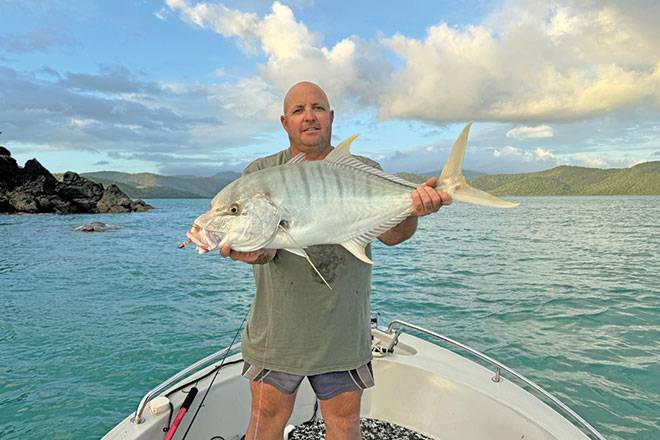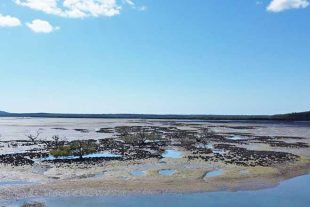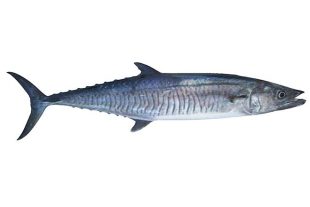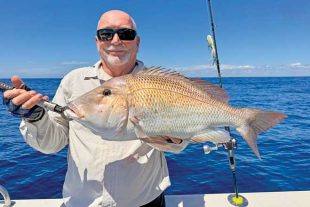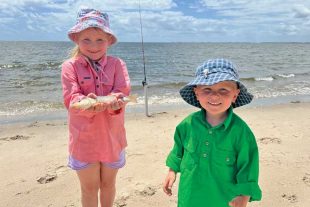Picking up from Part 1 in the April issue, the forecast looked a lot better for the following day so, as none of us had been to Bowen before, we decided to give that a run.
I’d done a heap of research on the Bowen area before this sortie and had a few marks that sounded quite good.
We also wanted to check out the jetty at Abbot Point, which was a fair run from Bowen.
We didn’t want to launch too early in Bowen because we had no idea what we were in for.
When we put the boat in at first light, it all looked fairly open, though the wind was already blowing at about 10 knots.
The run out was good, so we started heading out to one of the wrecks I’d plotted into the Garmin.
It was about a half hour run out with the tail wind.
By the time we got there and had a look around the wreck, the wind had picked up a little more and we were facing directly into it.
The electric motor was working hard on spot lock to hold us in position.
Luckily, we didn’t have to wait long, though the first bait to get to the bottom were no match for these fish.
We upgraded our leaders to 50lb, which did the trick and a couple of nice trout were welcomed to the Esky.
The trout were close to 65cm, which we were happy with.
We also had a couple of good smokings by bigger fish that were in among the trout.
By this stage, ‘Blowin’ Bowen’ started to live up to its reputation and, as the tide turned, the wind got stronger.
Getting a plastic down to the bottom took a lot of effort, yet it was rewarded with either a fingermark or trout.
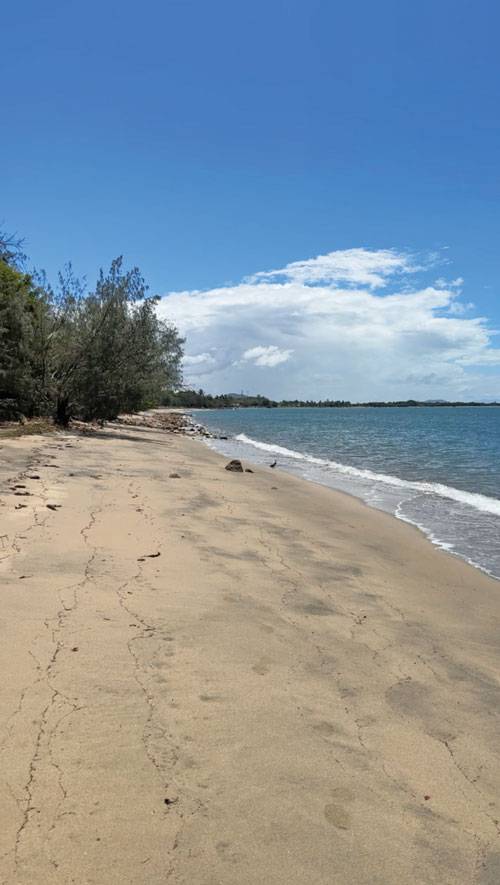
The Berkley Gulp 7” Jerk Shad always gets the nibbles in these situations and this occasion was no different.
Once the tide turned, it was even harder to stand up and get a plastic to the bottom, so we dropped more pilchard back near the wreck.
This produced a decent trout, a fingermark and a nice small-mouth nannygai.
We got drilled by a few bigger fish and, with the wind ramping up even more, we headed to sheltered water.
I still had a couple of shallow marks in my sounder, though as the trip back in wasn’t much fun, we put the boat on the trailer and drove to our accommodation in Cannonvale.
We decided to stay close to home and give Airlie a go the next morning.
We went back to the spot where Benny had caught the maori wrasse and tried fishing a little shallower with hard-bodies and plastics.
Straight up I scored a nice trout on a Samaki Redic, but it was a bit quiet.
We persisted in the shallower water and my plastic got eaten by something bigger, that ran along a rock ledge without busting me off.
After a short but brutal battle, a nice golden trevally surfaced next to the boat.
We moved around after that fish and threw everything we had at all the rocky points and ledges without a bite.
By then the wind had started to pick up again, so we travelled further north to look at some other headlands.
We found a big rock clump in the middle of the channel that was called Edwin Rock.
This was a serious piece of water – we marked some big fish sitting mid-water as we sounded around it.
We trolled a couple of lures without a touch.
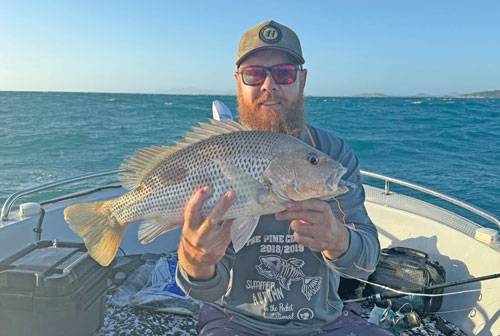
By this time, the tide had turned and everything turned ugly.
The wind was blowing about 15-20 knots and the tide was running hard directly into it, causing some fairly uncomfortable waves.
We made the long trip back to the ramp and decided to have another look at the Proserpine River.
That turned out to be a mistake.
The current was running so hard across the boat ramp, it was nearly tearing the pontoon away.
We put the boat in anyway and went for a run upstream to have a look for a crocodile.
With the tide being so high, we didn’t hold much hope.
While there is a lot of structure in the Proserpine River, it’s a river that definitely needs to be fished during a smaller tidal run and a lower tide.
We made the call that afternoon to head to Bowen for the remainder of our trip.
The constant wind at Airlie made it impossible to get out to the better islands to find decent fish, so Bowen looked to be the next best option.
We arrived at the Bowen ramp early the next morning.
Leaving the marina, we came across a feeding frenzy inside the end of the rock walls.
There were fish busting up everywhere, gorging themselves on small baitfish.
We hooked a couple briefly but they were zoned onto the baitfish and were simply too full to take any interest in our lures.
They appeared to be a variety of trevally.

We went to the same wreck we had caught good fish at previously and were straight back into them.
A couple of nice fingermark and a few quality trout were in the boat in the first half hour.
They were caught on a mixture of bait and 7” Berkley Gulp Jerk Shads.
Once again, the forecasters made a meal of the weather prediction and the electric couldn’t hold us on the mark.
We decided to head back in close and check out a couple of the other marks I had in the sounder.
They were only shallow areas, so we didn’t hold a lot of hope.
It turned out that the depth didn’t matter because the spot was loaded with fish.
I dropped my leader back to 30lb to get more bites but was instantly smoked by grass sweetlip and trout.
Even the 50lb leaders were getting shredded through the coral.
A couple of pieces of coral were pulled up and it was so sharp, we could barely hold it, which made getting the fish out a real mission.
We did end up getting some good trout, grassies, spanish flags and a range of other smaller trout and cod.
The next morning started off windy and, on arrival at the wreck, we quickly realised we wouldn’t be able to hold position.
The Abbot Point Jetty was about 20km to the north of where we were and was in closer to the bank.
The plan was to get in to the jetty comfortably using the following sea and then hope the wind dropped out a little once we were there.
I had a mark in the sounder close to the jetty that claimed to be a large bommie holding good trout and lippers.
It wasn’t lying.
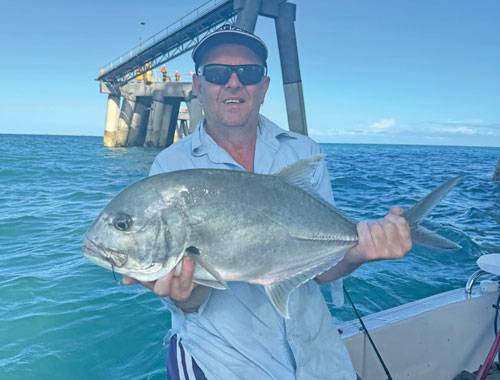
This big lump of reef was loaded with fish and we spent an hour pulling all sorts of species from it.
I did hook something very large on a 7” Berkley Gulp.
I’d say it was a big cod or groper that barely knew it was hooked, so I popped him off before the pain started.
We finally got to the jetty and were keen to get some bait and lures in around the pylons to see what sort of reef fish lived near it.
The water was about 21m deep out at the end, so it’s likely nearly everything lives there at certain times.
We struggled to lose a bait in tight to the pylons.
We did get busted off a couple of times, but it was quiet.
Shaun hooked a good fish out a bit wider, which needed to be towed back out into the open.
It ended up being a nice little giant trevally.
None of us were keen to catch trevally or queenfish, so we moved to a different area.
Shaun was on again, this time a small golden trevally.
Then he was on again shortly after and landed a small mackerel.
That was our queue to make the long trip back to the ramp.
Thankfully the wind had dropped off a little, making things slightly more comfortable.
The next morning was the windiest day we had at Bowen, so we went south to look for some new water.
We tried a new mark but the water was a terrible colour, and we couldn’t get a bite.
We kept moving around looking for better water, however we struggled.
We went back to one of our other marks, where the fish were straight on the chew!
More trout, grassies, flags and cod were caught.
The next day was forecast to rain a little and blow harder, so we didn’t bother even putting the boat in.
We had a bit of a fish around the beaches in Bowen chasing barramundi.
I hooked a decent fish about 70cm close to my feet, though unfortunately the hooks didn’t hold.
There are plenty of good-looking areas to target fish from the shore in Bowen.
It gives you more options when the wind is blowing and you can’t get offshore.
The weather was against us for the rest of the trip, so we cut our losses and headed back to Brisbane.
We will definitely be going back to Bowen again in the near future.
Hopefully, the weather gods are a bit friendlier on the next trip.
 Bush ‘n Beach Fishing Magazine Location reports & tips for fishing, boating, camping, kayaking, 4WDing in Queensland and Northern NSW
Bush ‘n Beach Fishing Magazine Location reports & tips for fishing, boating, camping, kayaking, 4WDing in Queensland and Northern NSW

